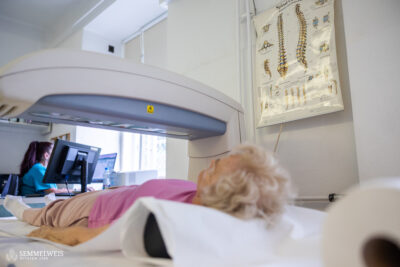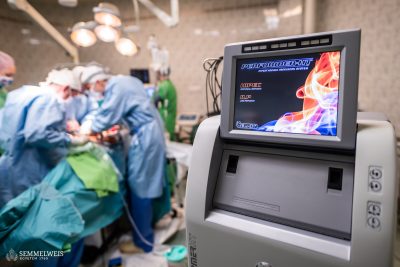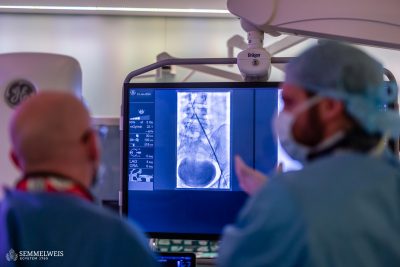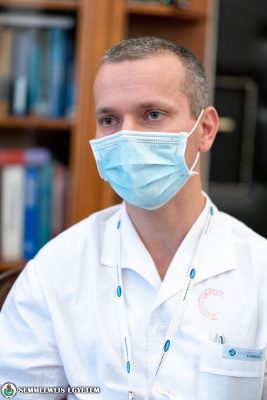 In the course of major surgeries, patients are at significant risk of complications due to the stress they experience. The fact that a patient gets bad news (they have a tumor, they will have an operation), they have to move to an unknown hospital environment from the safety of their home, there is going to be a wound which is painful and they can’t eat for a few days – all of these are stressors, Dr. Balázs Bánky, assistant professor at the Department of Surgery, Transplantation and Gastroenterology at Semmelweis University, said. According to him, the so-called ERAS (enhanced recovery after surgery) program, which was launched at the clinic in October and is about to expand, aims surgical interventions to be as stress-free as possible. This complex program considers all potential stressors and offers a well-thought-out response to everything from patient information to nutrition to pain relief, the expert explained.
In the course of major surgeries, patients are at significant risk of complications due to the stress they experience. The fact that a patient gets bad news (they have a tumor, they will have an operation), they have to move to an unknown hospital environment from the safety of their home, there is going to be a wound which is painful and they can’t eat for a few days – all of these are stressors, Dr. Balázs Bánky, assistant professor at the Department of Surgery, Transplantation and Gastroenterology at Semmelweis University, said. According to him, the so-called ERAS (enhanced recovery after surgery) program, which was launched at the clinic in October and is about to expand, aims surgical interventions to be as stress-free as possible. This complex program considers all potential stressors and offers a well-thought-out response to everything from patient information to nutrition to pain relief, the expert explained.
Prehabilitation is taking these to the next level, consisting of two distinct phases: a 4-6 week preparation period right before surgery, and the postoperative assisted recovery (ERAS), which operate as an integral unit but need to be built separately. The ERAS program was launched by the clinic in October, while the prehabilitation process itself could be completed early next year, said Dr. Attila Szijártó, a university professor and the director of the clinic.
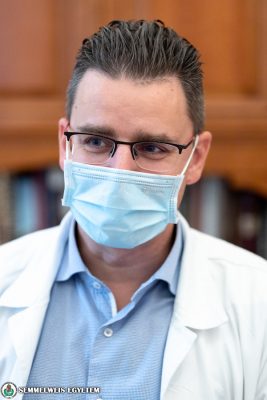 He added that each of these elements had been operating in the clinic before, but now they became part of a complex, organized program to help automate and improve the quality of care with the coordinated work of many professionals – surgeons, nurses, dieticians, physiotherapists, gastroenterologists, anesthesiologists.
He added that each of these elements had been operating in the clinic before, but now they became part of a complex, organized program to help automate and improve the quality of care with the coordinated work of many professionals – surgeons, nurses, dieticians, physiotherapists, gastroenterologists, anesthesiologists.
The importance of prehabilitation and the preparation period of 4-6 weeks before surgery gained ground in Western Europe and some North American institutions some years ago. The program is based on the fact that besides modern surgical techniques, the operation’s outcome can be significantly improved by the overall physical, nutritional and psychological preparation of the patient.
In other words, if we consciously dedicate the weeks before surgery to prepare the patient and bring them to the possibly best condition for the operation, just as a marathon runner prepares for a race, then there is a significantly better chance of successfully recovering from a major surgery. Thanks to the program, the patient will be an active participant in the preparation period and the therapeutic plan.
Thus, those weeks become more than a plain waiting period before the operation; they turn into a proper preparation period with tasks and regular medical and specialist checks. With the help of this method, patients are consciously working to improve their condition and recover as quickly as possible, which we hope will be reflected in all quality of life indicators, assistant lecturer Dr. András Fülöp said.
A very important part of prehabilitation to bring a lifestyle change to the patient’s daily life. He or she is expected to do regular and supervised exercise, dietary counseling to help her prepare, relaxation exercises, psychic training, and additional lifestyle counseling such as quitting smoking or alcohol. These elements are meant to be incorporated into the patient’s daily routine and will hopefully persist after surgery
– the assistant lecturer explained.
Prehabilitation consists of three main pillars. As part of the physical preparation (training), physiotherapists are helping to strengthen the muscle groups that are important for the operation, such as the respiratory muscles before abdominal surgery, and to increase the patient’s endurance through regular daily exercise. This is followed by nutritional therapy; beforehand, each patient undergoes a dietary assessment, where experts analyze their eating habits and body composition, so they can receive targeted dietary education.
The third, and perhaps most important element of the program is psychological support: with cancer patients, it is essential to assess the extent of depression and anxiety, and to support the patient mentally, with the involvement of a psychologist if necessary.
At the Clinic of Surgery, Transplantation and Gastroenterology, patients with colon cancer will be included in the program first. According to Dr. Balázs Bánky, Head of the clinic’s Coloproctology Team, about 10,000 new colon tumors are diagnosed in Hungary each year. Nearly 5-600 people are operated on each year; in the future, they would like to include all high-risk surgical patients in the prehabilitation program.
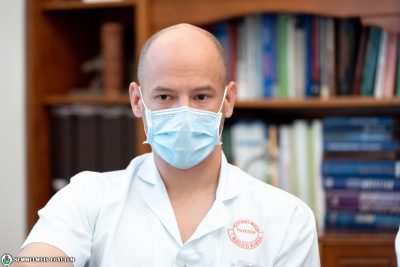 Dr. András Fülöp added that in recent months, the training and patient information booklets had been completed, including a task diary. By completing this, patients can provide feedback on how they are progressing on the preparation path that will help them recover. Thus, besides patient education and information, the key element of the method is to increase the activity of those involved. In other words, the patient is not only placed at the center of care by “undergoing” the treatment, but also actively collaborating with the health professionals and physicians who are treating him or her.
Dr. András Fülöp added that in recent months, the training and patient information booklets had been completed, including a task diary. By completing this, patients can provide feedback on how they are progressing on the preparation path that will help them recover. Thus, besides patient education and information, the key element of the method is to increase the activity of those involved. In other words, the patient is not only placed at the center of care by “undergoing” the treatment, but also actively collaborating with the health professionals and physicians who are treating him or her.
The program helps younger colorectal cancer patients to return to their families and work as soon as possible without complications and to have as many healthy life years as possible
– the clinical director added. Dr. Attila Szijártó also mentioned that in the spirit of the triple unit of the university – education, research, healing – they plan to build a well-functioning reference center, which could play an important role in the education of students and also research.
Orsolya Dávid
Translation: Viktória Kiss
Photo: Attila Kovács – Semmelweis University
